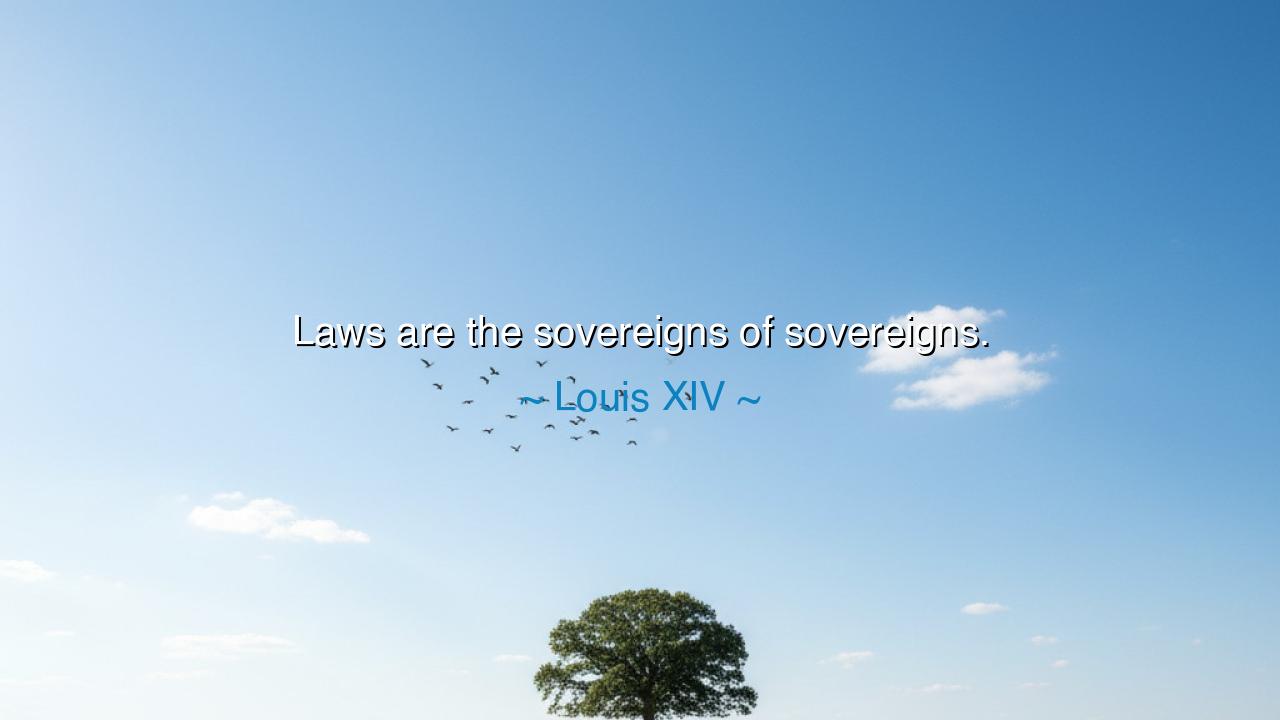
Laws are the sovereigns of sovereigns.






Hear, O seeker of truth, the voice of Louis XIV, the Sun King, who reigned with grandeur yet uttered this timeless wisdom: “Laws are the sovereigns of sovereigns.” Though he bore the crown of France and wielded near-absolute power, he recognized a higher order than kings, queens, and emperors. His words reveal that even the mightiest ruler, arrayed in gold and surrounded by armies, bends before the eternal authority of law. For law is the invisible throne, older than kingdoms, stronger than swords, and binding upon all.
The meaning of this teaching lies in the acknowledgment that laws govern not only the subjects of a realm but the rulers themselves. A sovereign may command men, but law commands the sovereign. Without law, power becomes mere force, and the crown becomes a tyrant’s bauble. But with law, authority gains legitimacy, justice holds sway, and the people see not only a ruler but a guardian. Thus Louis, though famed for declaring “I am the state,” also confessed in these words that even the state bows before the supremacy of just order.
History has borne witness to this truth again and again. Consider the tale of King John of England, who in 1215 was compelled by his barons to seal the Magna Carta. Though he ruled by divine right, his excesses and abuses brought rebellion to his door. In that charter was enshrined the principle that not even the king was above the law. From that moment, the seed of constitutional government was sown, and it grew to remind future rulers that their power was not unbounded but tethered to justice. Here we see the living proof that laws are the sovereigns of sovereigns.
Think too of Napoleon Bonaparte, conqueror of Europe. He rose to power through brilliance and ambition, but his true legacy was not merely battles won, but the Napoleonic Code, the body of civil law that shaped nations long after his empire fell. Empires crumbled, crowns toppled, but the laws endured, becoming the true sovereigns, guiding the lives of peoples for centuries. Thus, kings pass, but law remains eternal, greater than the flesh of any ruler.
Mark this well, O listener: when rulers forget this truth, disaster follows. Where the law is trampled, chaos rises; where justice is mocked, rebellion grows. The French Revolution itself was born when kings and nobles exalted themselves above the rules meant to guide them. The guillotine became their answer, for when rulers deny the sovereignty of law, the people rise to enforce it with blood. Even the Sun King’s descendants learned this bitterly when their throne was toppled by revolution.
Let this be the lesson: in your own life, honor the power of law as the guardian of fairness and order. Do not treat rules lightly, nor assume they bind only the weak. Recognize that every law, when justly made, is a fortress protecting all, from the peasant to the king. If you are given authority—whether over a household, a community, or a nation—remember that you too are bound, that your strength is not freedom from the law, but obedience to it.
Therefore, O child of tomorrow, carry Louis XIV’s words as both warning and shield. Seek leaders who respect the sovereignty of law, and be wary of those who exalt themselves above it. Defend the principles of justice, for they are older and greater than crowns, armies, or treasures. For in truth, it is the law that rules rulers, the law that protects nations, the law that endures when all else crumbles.
Thus, the words of the Sun King shine across ages: “Laws are the sovereigns of sovereigns.” And in their brilliance we see the path to justice, stability, and peace—not in the will of one man, but in the eternal majesty of law itself.






AAdministratorAdministrator
Welcome, honored guests. Please leave a comment, we will respond soon